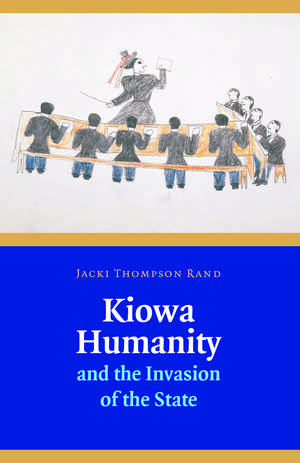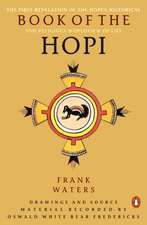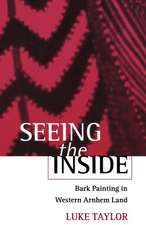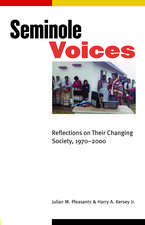Kiowa Humanity and the Invasion of the State
Autor Jacki Thompson Randen Limba Engleză Hardback – 29 feb 2008
Kiowa Humanity and the Invasion of the State illuminates the ways in which Kiowas on the southern plains dealt with the U.S. government’s efforts to control them after they were forced onto a reservation by an 1867 treaty. The overarching effects of colonial domination resembled those suffered by other Native groups at the time—a considerable loss of land and population decline, as well as a continual erosion of the Kiowas’ political, cultural, economic, and religious sovereignty and traditions. Although readily acknowledging these far-reaching consequences, Jacki Thompson Rand sees the root impact of colonialism and the concomitant Kiowa responses as centered less on policy disputes than on the disruptions to their daily life and to their humanity. Colonialism attacked the Kiowas on the most human, everyday level—through starvation, outbreaks of smallpox, emotional disorientation, and continual difficulties in securing clothing and shelter, and the Kiowas’ responses and counterassertions of sovereignty thus tended to focus on efforts to feed their people, sustain the physical community, and preserve psychic equilibrium.
Offering a fresh, original view of Native responses to colonialism, this study demonstrates amply that Native struggles against the encroachment of the state go well beyond armed resistance and political strategizing. Rand shows that the Native response was born of everyday survival and the yearning for well-being and community
Preț: 252.72 lei
Nou
Puncte Express: 379
Preț estimativ în valută:
48.36€ • 50.49$ • 39.93£
48.36€ • 50.49$ • 39.93£
Carte disponibilă
Livrare economică 25 martie-08 aprilie
Preluare comenzi: 021 569.72.76
Specificații
ISBN-13: 9780803239661
ISBN-10: 0803239661
Pagini: 210
Ilustrații: 6 photographs, 1 figure, 3 tables, index
Dimensiuni: 140 x 216 x 15 mm
Greutate: 0.41 kg
Editura: Nebraska
Colecția University of Nebraska Press
Locul publicării:United States
ISBN-10: 0803239661
Pagini: 210
Ilustrații: 6 photographs, 1 figure, 3 tables, index
Dimensiuni: 140 x 216 x 15 mm
Greutate: 0.41 kg
Editura: Nebraska
Colecția University of Nebraska Press
Locul publicării:United States
Notă biografică
Jacki Thompson Rand is Choctaw and an associate professor of history at the University of Iowa.
Cuprins
Acknowledgements
Chapter One: The American Problem
Chapter Two: The Kiowa Scheme of Life
Chapter Three: Values of the State and U.S. Indian Policy
Chapter Four: Young Men, Kiowa Social Values, and the Politics of Rations
Chapter Five: Colonial (Counter) Representations, Fictions of the Nineteenth-Century American Assimilation Policy
Chapter Six: Households of Humanity
Conclusion
Appendix A: Sources for Federal Appropriations, Disbursements, and Accounting for Funds Related to the Federal Indian Policy, 1860-1910
Appendix B: Government Document Sources of Population Figures
Bibliography
Chapter One: The American Problem
Chapter Two: The Kiowa Scheme of Life
Chapter Three: Values of the State and U.S. Indian Policy
Chapter Four: Young Men, Kiowa Social Values, and the Politics of Rations
Chapter Five: Colonial (Counter) Representations, Fictions of the Nineteenth-Century American Assimilation Policy
Chapter Six: Households of Humanity
Conclusion
Appendix A: Sources for Federal Appropriations, Disbursements, and Accounting for Funds Related to the Federal Indian Policy, 1860-1910
Appendix B: Government Document Sources of Population Figures
Bibliography
Recenzii
"Rand has written a book that explores the complications and nuances of Native history, one that should be used by scholars, journalists, and museum curators in better integrating American Indians into that national consciousness and academic discourse."—Jill Norgren, American Historical Review
"Rand's account of Kiowa creativity under life-threatening conditions offers a compelling synthesis of agency and oppression, one that asks readers to take genocide seriously while affirming Kiowa—and Native—humanity."—Jeffrey Ostler, Journal of Interdisciplinary History
"This is a well-written and genuinely intriguing story, and Rand weaves together a concise portrait of federal Indian policy towards the Kiowas during the nineteenth century. Her reengagement of Jenning's conquest model of Indian history should provoke ample discussion and engage new debates in the field."—Nathan Wilson, Great Plains Quarterly
"[Kiowa Humanity and the Invasion of the State] fills a void within Native American history by interweaving the social and political milieu of the reservation period with the basic facts related to American Indian actions as the American frontier rolled over and through American Indian cultures."—Joe Watkins, New Mexico Historical Review
"Rand has found useful sources to reinforce "Kiowa humanity" (and by implication other Natives) and prompts readers to rethink language and perspectives ingrained in traditional American history narratives."—Robert W. Galler, Jr., Western Historical Quarterly











